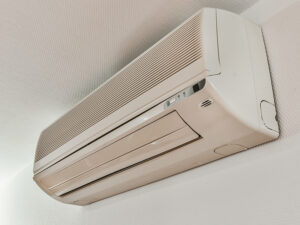Is Black Mold in an Air Conditioner Dangerous?
 Is black mold in an air conditioner dangerous? The short answer is yes. Black mold is dangerous anywhere in your home, especially in your air conditioner.
Is black mold in an air conditioner dangerous? The short answer is yes. Black mold is dangerous anywhere in your home, especially in your air conditioner.
Unfortunately, black mold can quickly spread. If you have it in your air conditioner, it won’t be long until it reaches your home’s air ducts.
Black mold can be toxic to those around it, so it is vital to remove it as soon as possible. Luckily, Davis Home Services has the tools and experienced professionals needed for the job.
Our experts know how dangerous black mold can be in your home. We provide meticulous mold removal services to clean your air conditioner and protect your home’s indoor air. When you need expert HVAC services, call the AC service technicians in Burlington from Davis Home Services.
What Is Black Mold?
Black mold, or toxic mold, thrives in moist, humid, and dirty environments. Also known as Stachybotrys chartarum, black mold is a greenish-black substance found in places with high humidity, water damage, leaks, and flooding.
Toxic mold thrives on various types of materials, including:
- Lint
- Gypsum board
- Paper
- Fiberboard
- Dust
Your air conditioner unit collects a significant amount of dust and debris as it cools your house. Without proper maintenance, it can attract black mold and impact your home’s indoor air quality.
How Can Black Mold Impact Your Health?
Although mold is especially harmful to children, elderly adults, and people with weakened respiratory systems, it can also make any healthy adult sick. Black mold consists of tiny and invisible mold spores, which are easy to inhale. Inhaling mold spores can irritate your lungs and throat, causing various health issues, including:
- Trouble breathing
- Wheezing
- Irritated nose, throat, and eyes
- Nausea
- Vomiting
- Rashes or irritated skin
- Chronic cough
- Focus or attention problems
Black mold can lead to pneumonia, sinusitis, bronchitis, and asthma attacks in more severe cases.
Symptoms of black mold exposure are similar to the common cold or food poisoning. If you or anyone in your home experience these symptoms for more than a few days, it is vital to seek medical attention and check for black mold.
How to Spot Black Mold in Your Air Conditioner
Is black mold in an air conditioner dangerous? Yes, so it is crucial to know how to spot it in your house.
Unfortunately, many people don’t realize they have black mold in their house until they are sick. Below are some common signs to be aware of that could indicate black mold in your air conditioner unit.
Musty Odor
If your home suddenly has a musty or moldy smell, it could be a sign of black mold growth. Check your air conditioner and air ducts as soon as you notice any strange or musty odors in your home.
Dirty Air Filters or Evaporator Coils
Black mold can often grow in your unit’s air filter or evaporator coils. Since these are internal components, it can be easy to overlook them. However, black mold can grow just as quickly inside your unit as it would around it.
If your air filters or coils are dirty, there is a chance that mold is present. Replace your filter or call Davis Home Services to schedule a professional evaporator coil cleaning.
Mold Around the Air Ducts
One of the more apparent signs of black mold is seeing it grow around your AC system and air ducts. Call us right away if you see mold or excessive debris around your air conditioning unit. We’ll provide a professional cleaning and test for black mold.
Can You Prevent Black Mold in Your Air Conditioner?
Preventing black mold is easier than cleaning it and recovering from it. Homeowners can take various steps to prevent mold growth in their houses, such as:
- Ensure proper sealing: Mold thrives in moist and humid environments. Ensuring that the seals around your sink, showers, and windows are secured can help prevent black mold from growing in your home.
- Invest in dehumidifiers: Dehumidifiers are devices that remove moisture from the air in your home. Investing in a whole-house dehumidifier can improve your home’s indoor air quality and prevent black mold.
- Address leaks right away: Fixing water leaks, flooding, or overflows as soon as possible is crucial for preventing mold and bacterial growth in your home.
Scheduling routine HVAC system maintenance is another excellent way to prevent black mold and keep your air conditioner running efficiently all year long.
Professional Black Mold Removal for Residential and Commercial Air Conditioners
If you spot black mold in your air conditioner or somewhere else in your house, let the professionals handle it. Black mold is dangerous to anyone near it, and professionals have the tools and safety equipment needed for safe and effective mold removal.
In some cases, it may be more cost-effective to buy a new air conditioner rather than clean it. However, it is generally cheaper to clean central air conditioning systems since they also consist of air ducts.
Your Davis Home Services technician will inspect your system and help you determine which solution is best for your home and budget. We know how frustrating it can be to deal with black mold in your home. We strive to make the process easier by providing professional black mold removal and HVAC repair services.
Our black mold removal services involve more than just cleaning your AC system. It also includes:
- Air filter replacements
- Air duct and drip pan cleanings
- Air duct insulation
Our technicians will also look for any potential problems in your AC unit that could cause further damage to your system. To help prevent additional issues, we can show you various humidity control options and proper maintenance steps for your air conditioning system.
Davis Home Services Can Help
Is black mold in an air conditioner dangerous? It can be, but our HVAC and plumbing services can help you improve your home’s indoor air quality and restore your heating and cooling systems.
Whether you have a window air conditioner or a mini-split system, Davis Home Services can help you restore clean and cool air in your home. Call us today at (844) 226-9872 to schedule service in New Jersey.

